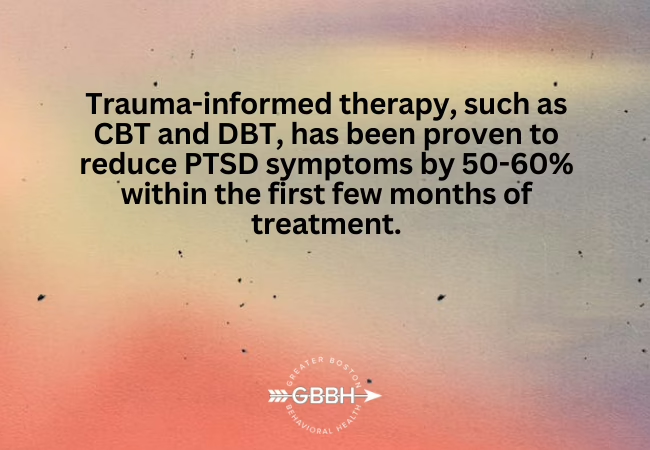Trauma is a deeply personal and complex experience that can have a profound impact on an individual’s mental, emotional, and physical well-being. Whether it stems from a single distressing event or prolonged exposure to hardship, trauma can reshape the way we see ourselves, others, and the world around us. Understanding the intricate relationship between trauma and mental health is crucial in fostering resilience and facilitating healing.
At Greater Boston Behavioral Health, we provide specialized trauma therapy programs and other tailored mental health treatment programs to help individuals process their experiences, develop coping strategies, and work toward recovery.
Understanding Trauma: What Is It?
Trauma is any deeply distressing or disturbing experience that overwhelms an individual’s ability to cope. While some people recover naturally, others experience long-term emotional and psychological distress.
Types of Trauma
- Acute Trauma – Results from a single distressing event, such as an accident, assault, or natural disaster.
- Chronic Trauma – Occurs due to repeated exposure to traumatic situations, such as childhood abuse, domestic violence, or ongoing bullying.
- Complex Trauma – Arises from multiple traumatic experiences, often beginning in childhood and affecting various aspects of life.
- Secondary or Vicarious Trauma – Experienced by individuals who are indirectly exposed to trauma, such as first responders, therapists, or caregivers.
Each form of trauma can have unique and lasting effects on mental health, making trauma-informed care essential for healing.
The Connection Between Trauma and Mental Health
Experiencing trauma significantly increases the risk of developing mental health disorders. Studies show that individuals with a history of trauma are more likely to suffer from conditions such as:
1. Post-Traumatic Stress Disorder (PTSD)
PTSD is one of the most well-known trauma-related disorders, affecting approximately 7-8% of the U.S. population at some point in their lives. Symptoms of PTSD may include:
- Intrusive thoughts, flashbacks, or nightmares related to the traumatic event.
- Avoidance of reminders associated with the trauma.
- Emotional numbness or difficulty experiencing joy.
- Hypervigilance and heightened anxiety.
2. Depression
Individuals who have experienced trauma, particularly early-life adversity, have a higher risk of developing depression. Symptoms may include:
- Persistent sadness, hopelessness, and loss of interest in activities.
- Low energy and fatigue.
- Difficulty concentrating or making decisions.
- Changes in sleep and appetite patterns.
3. Anxiety Disorders
Trauma can leave individuals in a heightened state of fight-or-flight, leading to excessive fear, worry, and panic attacks. Common trauma-related anxiety disorders include:
- Generalized Anxiety Disorder (GAD) – Chronic worry and fear that disrupt daily life.
- Panic Disorder – Sudden episodes of intense fear or terror.
- Social Anxiety Disorder – Fear of social interactions due to underlying trauma.
4. Substance Use Disorders (SUDs)
Many people turn to drugs or alcohol to numb the emotional pain of trauma. Studies show that up to 75% of individuals in addiction treatment have experienced trauma. Without proper mental health treatment, substance abuse can create a cycle of avoidance, worsening trauma symptoms over time.
5. Personality Disorders
Long-term trauma, especially in childhood, is linked to borderline personality disorder (BPD) and other personality disorders. These conditions often involve:
- Emotional dysregulation and mood swings.
- Unstable relationships and fear of abandonment.
- Impulsive or self-destructive behaviors.
The impact of trauma on mental health underscores the need for professional treatment, including CBT therapy, DBT therapy, and trauma therapy programs tailored to individual needs.
Recognizing the Signs of Trauma-Related Mental Health Issues
Identifying trauma-related symptoms is the first step in seeking help. Common signs include:
- Frequent flashbacks or nightmares about a distressing event.
- Feeling detached or disconnected from reality or loved ones.
- Intense emotional reactions (anger, sadness, guilt) to certain triggers.
- Avoidance of places, people, or activities that remind you of the trauma.
- Engaging in self-destructive behaviors, such as substance use or self-harm.
- Struggling with chronic anxiety, fear, or hypervigilance.
- Feeling hopeless, numb, or empty.
If these symptoms persist or interfere with daily functioning, seeking treatment at a mental health treatment center in Boston can be life-changing.

Effective Trauma Therapy Approaches
Healing from trauma requires a comprehensive approach that includes therapy, self-care, and support from mental health professionals. At Greater Boston Behavioral Health, we use evidence-based treatments to help individuals regain control over their lives.
1. Trauma Therapy Program
A structured trauma therapy program provides individuals with a safe space to process and heal from past experiences. Treatment may include individual and group therapy sessions designed to reduce trauma symptoms.
2. Cognitive Behavioral Therapy (CBT Therapy)
CBT is one of the most effective treatments for trauma-related mental health disorders. It focuses on:
- Identifying and challenging negative thought patterns.
- Developing coping strategies to manage stress and triggers.
- Gradually exposing individuals to traumatic memories in a safe, controlled way.
3. Dialectical Behavior Therapy (DBT Therapy)
DBT is particularly helpful for individuals with emotional dysregulation and personality disorders linked to trauma. This therapy teaches:
- Mindfulness techniques to stay present and manage emotions.
- Distress tolerance skills to reduce impulsive reactions.
- Interpersonal effectiveness to improve relationships.
4. Intensive Outpatient Program (IOP) & Partial Hospitalization Program (PHP)
For individuals who need structured care but do not require inpatient treatment, IOP and PHP offer intensive therapy sessions while allowing individuals to continue daily responsibilities.
5. Inpatient and Residential Treatment Programs
In cases where trauma has significantly disrupted daily life, inpatient and residential treatment programs provide 24/7 care in a safe and supportive environment.
6. Holistic and Alternative Therapies
Many individuals benefit from alternative trauma treatments, including:
- Art and music therapy to express emotions.
- Yoga and meditation for relaxation and grounding.
- EMDR (Eye Movement Desensitization and Reprocessing) to reprocess traumatic memories.
These therapies help individuals reconnect with themselves and build resilience.
Why Seeking Professional Help is Essential
While some individuals try to cope with trauma on their own, professional trauma therapy programs provide the structured support needed for long-term healing. Without treatment, trauma can lead to chronic mental health issues, relationship difficulties, and substance abuse.
At Greater Boston Behavioral Health, we provide compassionate, expert care to help individuals process their experiences, develop coping skills, and rebuild their lives.
Our Mental Health Treatment Programs Include:
- Trauma Therapy Program
- Behavioral health in Boston services
- Intensive Outpatient Program (IOP)
- Inpatient Treatment Program
- Residential Treatment Program
- Partial Hospitalization Program (PHP)
- DBT Therapy & CBT Therapy
- Comprehensive Mental Health Therapy Programs
Conclusion
Healing from trauma is possible with the right support. If you or a loved one is struggling with trauma-related mental health issues, seeking professional help can be the first step toward recovery and self-empowerment.
At Greater Boston Behavioral Health, we are committed to providing compassionate, trauma-informed care that empowers individuals to reclaim their lives. Call us today at 888.278.0716 to learn more about our mental health treatment programs in Boston and take the first step toward healing.
Frequently Asked Questions (FAQ)
How does trauma affect mental health?
Trauma can lead to various mental health disorders, including PTSD, anxiety, depression, and substance use disorders. It can alter brain function, making it difficult to process emotions, regulate stress, and maintain relationships.
What are the signs of trauma-related mental health issues?
Common signs include flashbacks, nightmares, emotional numbness, anxiety, depression, social withdrawal, and difficulty trusting others. Physical symptoms such as insomnia and chronic pain can also occur.
What are the best therapies for trauma recovery?
Evidence-based treatments such as Cognitive Behavioral Therapy (CBT), Dialectical Behavior Therapy (DBT), Eye Movement Desensitization and Reprocessing (EMDR), and trauma-focused therapy are effective in helping individuals heal from trauma.
What is a Trauma Therapy Program?
A Trauma Therapy Program provides structured support through individual and group therapy, helping individuals process trauma in a safe environment. Programs often include DBT therapy, CBT therapy, and holistic healing methods.
Do I need inpatient treatment for trauma-related mental health issues?
It depends on the severity of your symptoms. If trauma has significantly impacted your daily life, an Inpatient Treatment Program or Residential Treatment Program may be beneficial. Otherwise, an Intensive Outpatient Program (IOP) or Partial Hospitalization Program (PHP) may provide the right level of support.
How does CBT help with trauma?
Cognitive Behavioral Therapy (CBT) helps individuals identify negative thought patterns, develop coping strategies, and gradually process traumatic experiences in a controlled way. It is a highly effective approach for PTSD, anxiety, and depression.
How long does trauma therapy take?
The duration of trauma therapy varies depending on individual needs. Some people see improvements within a few months, while others may need long-term therapy to address deep-rooted trauma.
Where can I find trauma therapy in Boston?
At Greater Boston Behavioral Health, we offer specialized trauma therapy programs, mental health treatment programs, and behavioral health services in Boston. Our team provides compassionate, evidence-based care tailored to individual needs.

